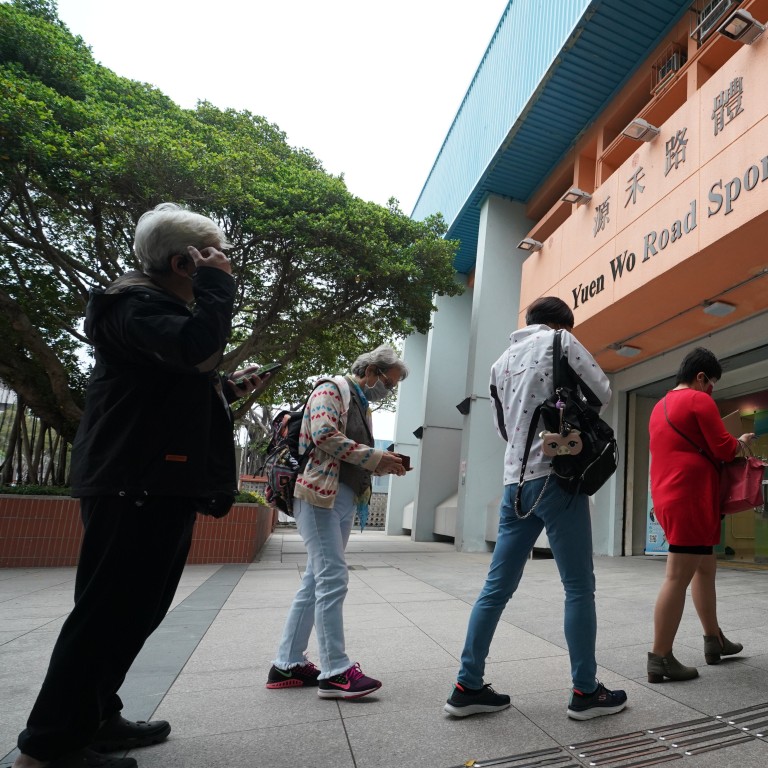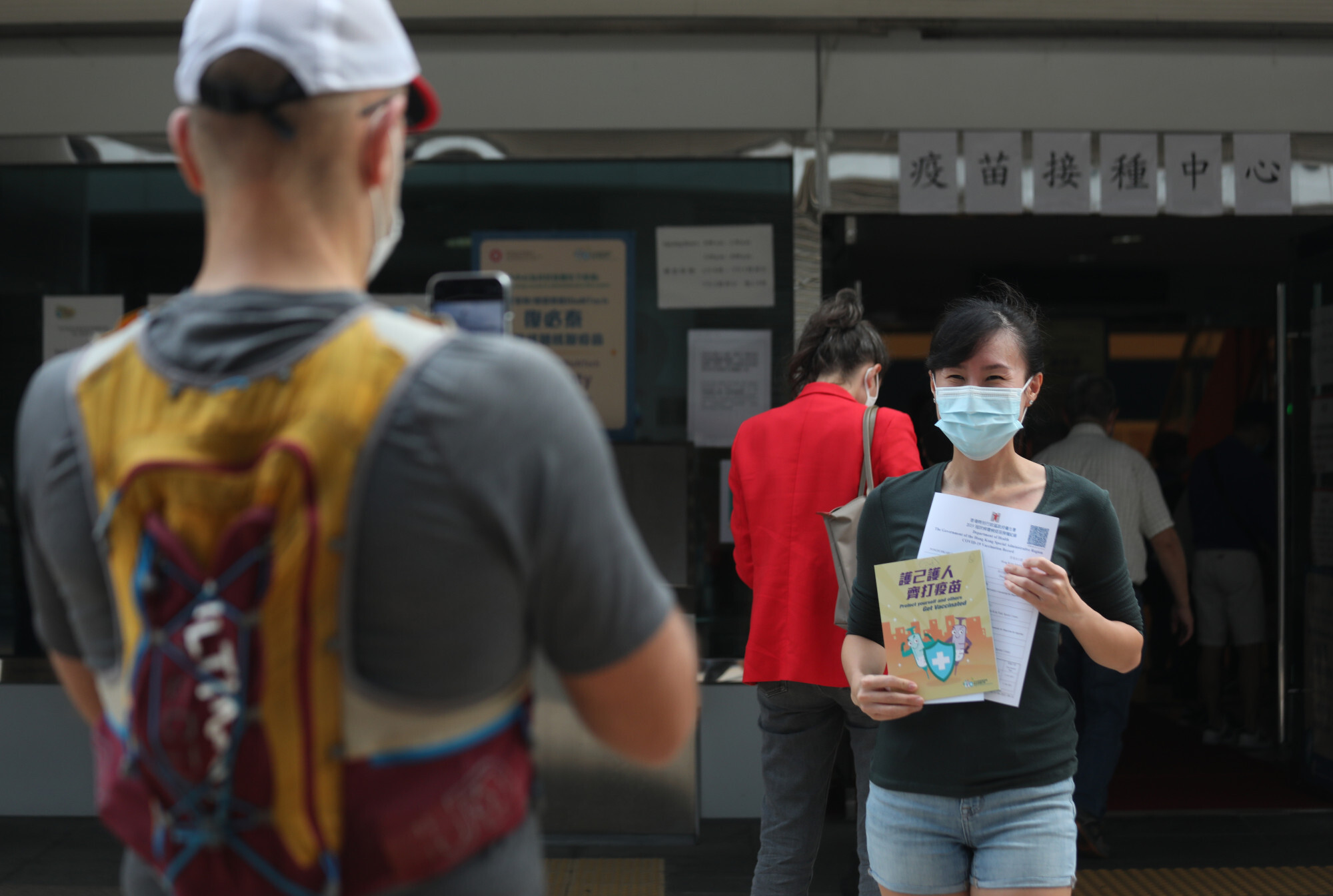
Hong Kong expands coronavirus vaccination programme to those aged under 30; BioNTech shots to close in September
- Minister warns deadline for BioNTech jabs is just a few months away, with first doses required by end of August before centres close the following month
- Hong Kong officials confirm six coronavirus infections, of which two are locally transmitted and the rest imported
Hong Kong will allow those aged under 30 to start booking their Covid-19 jabs next week in an expansion of the city’s vaccination programme, the government has announced.
Top officials on Thursday also revealed Hong Kong would not be acquiring a third type of vaccine this year, as they urged residents with a preference for the BioNTech version to get their first shot by the end of August, before the closure of the city’s 29 community vaccination centres in late September.
The announcement of the scheme’s expansion came as the city confirmed six new coronavirus cases. Of the two locally transmitted infections, one was untraceable. The rest were imported from France, India, Italy and the Philippines.
Under the expanded programme, residents aged 16 or above would be able to receive the German-made BioNTech doses, while those older than 18 could opt for the mainland China-produced Sinovac vaccine, civil service chief Patrick Nip Tak-kuen told a press conference.
“We have received feedback from different people hoping the government includes young people aged 30 or younger [into the scheme],” said Nip, who oversees the city’s vaccination programme.
“If some of their family members could not be vaccinated due to physical conditions such as chronic diseases that have not come under control, vaccinated younger members could build a protection net to protect older and weaker people.”
Opening up the Covid-19 vaccinations scheme to the 1.08 million Hong Kong residents aged between 16 and 29 takes the total number of people eligible in the city to 6.5 million, amounting to 88 per cent of its population.
Currently, only those aged 30 and above are allowed to receive a jab through the scheme, although younger people can if they belong to groups such as health care workers, teachers and restaurant staff.
All of those in the younger age group will be able make appointments online from next Friday to receive the shots at one of the city’s community vaccination centres and general outpatient clinics.
BioNTech vaccination slots must be booked at least two days in advance, while it is possible to secure a Sinovac appointment for the very next day.
Those aged 18 or above only need to present their identity documents to get vaccinated, but 16 or 17 year olds require parental consent. A template for a parental consent form is available on the government’s website.
Three more community vaccination centres will be providing BioNTech jabs: Tseung Kwan O Sports Centre, Yau Oi Sports Centre in Tuen Mun and Osman Ramju Sadick Memorial Sports Centre in Kwai Chung.
The move reverts those three centres back to BioNTech ones, after they were previously flipped to Sinovac to meet public demand for those jabs.
Two of the centres – in Tseung Kwan O and Tuen Mun – will begin offering the BioNTech vaccine on April 20, while also administering a small number of Sinovac doses until April 30.
“During this transition period of around two weeks, these two centres would have designated zones for different vaccines,” Nip said.
The Kwai Chung centre will start providing the German-manufactured jabs on May 1, at which point there will be 24 BioNTech and five Sinovac community vaccination venues in the city.
Nip also urged the public to get vaccinated as soon as possible, especially those hoping to receive BioNTech jabs, which are only available at community vaccination centres for most of the public.
“The supply period of the BioNTech vaccine is limited,” Nip said. “After taking into account the supply, vaccination rates and storage limitations of the BioNTech vaccine, the government will maintain operation of the community vaccination centres for the jab until late September.”
He explained that the BioNTech vaccine could only be kept for three to four months under the required storage temperature of minus 70 degrees Celsius, and at most five days after thawing.
“Those hoping to get a BioNTech vaccine must get their first dose by the end of August, and so they could get their second dose on time by late September,” he said.
Vaccination centres for the Sinovac jabs would also operate until late September, but those vaccines could still be available with private doctors and at general outpatient clinics after that date.
“We hope to make good use of the capacity of our vaccination centres from now on until the end of September. The BioNTech vaccination centres can handle about 40,000 doses a day. At present, we have not used up the quotas,” Nip said.

Hong Kong has ordered 7.5 million doses of vaccines from BioNTech. So far, 1.94 million doses have been delivered to the city, leaving some 5.56 million doses still to be supplied.
A government source said the last batch of BioNTech vaccines was expected to arrive in the city in July, regardless of whether Hong Kong had used up all the doses it had ordered. The supply will end after that as BioNTech still has to fulfill orders from other countries. But the city’s government is in discussion with the manufacturer on acquiring second-generation vaccines that could offer better protection for next year.
Professor David Hui Shu-cheong, who advises the government on the pandemic, said a citywide vaccination programme was needed to be completed as soon as possible to develop herd immunity.
“It is meaningless to stretch the operation of a vaccination programme, as many people [who have not been vaccinated] could be infected,” Hui said, warning that new waves of infections could emerge if inoculation was done slowly.
“The effects of a vaccination programme could only be seen by getting it done quickly, like what was being done in Israel or Britain,” he said.
He said it was likely that the city would use up all the BioNTech vaccines it had ordered.
“Hongkongers usually would rush for an item if they know it would soon run out,” he said.
Health minister Professor Sophia Chan Siu-chee said the city’s vaccination rate would be an important factor for other governments as they considered reintroducing travel links with the city.
“It is very likely that other places would reduce quarantine periods for vaccinated people or exempt them,” Chan said.
She added there was still “large room for improvement” when it came to the city’s vaccination rate.
“I’m worried that later this year when other places relax quarantine restrictions for travel, Hong Kong’s vaccination rate may still not be high enough, and our travellers cannot benefit from these measures,” Chan said.
Chan previously said the government had asked British-Swedish pharmaceutical giant AstraZeneca to delay its delivery of 7.5 million vaccine doses, which were originally estimated to arrive in the second half of the year.
She reiterated on Thursday that only Sinovac and BioNTech vaccines would be available in Hong Kong in 2021.
The AstraZeneca vaccines would not be supplied to the city this year to avoid any wastage amid global shortages of Covid-19 jabs, she added.
While Chief Executive Carrie Lam Cheng Yuet-ngor mentioned on Monday that the government was considering halting free Covid-19 testing services for people who were not issued a mandatory testing order, Chan said there was no plan to end the distribution of specimen bottles at the moment.
“The government will continue to be responsible for offering free tests,” she said. “We have no plan to stop giving out the specimen bottles and no plan to close any of the testing centres.”
Additional reporting by Ng Kang-chung



